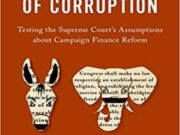Internal emails obtained yesterday by The Washington Free Beacon brought to light a coordinated campaign by Democratic lawmakers and allied environmental groups to attack nonprofits opposed to climate change legislation. The emails detail a plan in which 19 Democratic Senators were assigned specific nonprofits to call out and criticize in speeches made on the chamber floor yesterday and today. Regardless of one’s views on climate change, it is reprehensible for Senators to use such a grand platform to attack groups simply for contributing to public policy debates.
Sadly, it’s not the first time in recent memory that members of the Senate have attacked nonprofits they consider to be on the “wrong” side of particular policy issues. In 2013, Senator Dick Durbin (D-IL) was widely criticized – including by over 300 state legislators – for sending letters to organizations that may have supported the American Legislative Exchange Council (ALEC) demanding to know their position on “stand your ground” laws. (CCP received a copy of Durbin’s letter, and spelled out our concerns about the use of official Senate letterhead to intimidate ALEC supporters in a reply.)
More infamously, the IRS scandal was driven in part by letters from prominent Senate Democrats demanding investigations into nonprofit speech. Similarly, the “John Doe” fiasco in Wisconsin had roots in paranoia about speech by nonprofits. Harassment of nonprofits with dissenting views has become so common that it is now the subject of a book, Kimberley Strassel’s The Intimidation Game.
Whatever one thinks of climate change, the eagerness of Senators to attack groups for their beliefs is contrary to the spirit of the First Amendment. It’s more like the spirit of McCarthyism. People of all beliefs and ideological backgrounds will be less inclined to support positions that differ from those in power after seeing how members of Congress are treating dissent on climate issues.
Equally worrisome is the resolution introduced by Senator Sheldon Whitehouse (D-RI) in conjunction with seven other Democratic Senators to formally condemn these groups’ views on environmental policy:
Resolved by the Senate (the House of Representatives concurring), That Congress—
(1) disapproves of activities by certain corporations, trade associations, foundations, and organizations funded by those corporations—
(A) to deliberately mislead the public and undermine peer-reviewed scientific research about the dangers of their products; and
(B) to deliberately cast doubt on science in order to protect their financial interests; and
(2) urges fossil fuel companies and allied organizations to cooperate with active or future investigations into—
(A) their climate-change related activities;
(B) what they knew about climate change and when they knew that information;
(C) what they knew about the harmful effects of fossil fuels on the climate; and
(D) any activities to mislead the public about climate change.
Setting aside the (im)propriety of such a resolution, it’s interesting to consider how campaign finance and tax law impact this debate. In picking a fight with nonprofits, Senators have chosen targets that have a hand tied behind their back. Tax-exempt 501(c)(3) organizations, many of which are scheduled to be named by Senators on the chamber’s floor, are prohibited by law from supporting or opposing candidates, and the law surrounding nonprofit political speech is incredibly complex. Criticizing public officials can become a minefield for these groups, who often must consult with an attorney – costing precious time and money – prior to mentioning an elected official by name. Thus, it is easy for Senators to scold these groups, knowing that many of them are legally prohibited from running ads during election season to respond to their attackers.
Mixing complex laws that make it difficult to speak with politicians’ natural inclination to target organizations with which they disagree is a toxic combination for free speech.
So far, it has been mainly political conservatives who have called out this unfair treatment of groups opposed to stricter laws on climate change. Liberals, moderates, and every other civic-minded person should join them. If intimidation of speakers by those in power becomes acceptable, every group that promotes ideas unpopular with those in government may someday be at risk.














